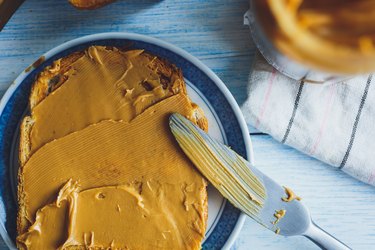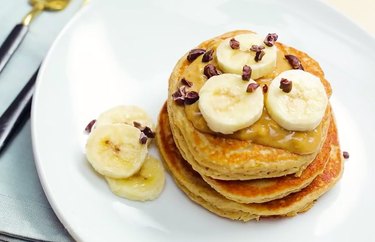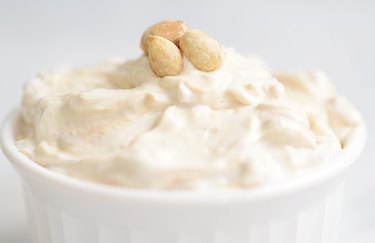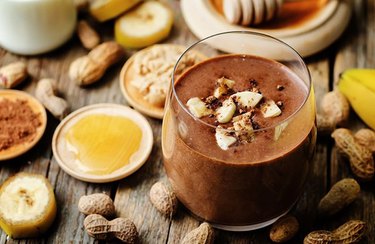
Whether you're a general gym-goer, athlete or bodybuilder, it's no secret that many fitness lovers go nuts over peanut butter. This creamy spread can be a super healthy snack, especially if you choose a peanut butter jar that boasts zero additives like sugar and inflammatory oils.
And while most people are probably satisfied just eating it straight out of the jar, adding the spread to your breakfast pancakes or smoothie is a great way to balance out your meal with protein, fat and some carbs — deeming it a solid muscle-building snack.
Video of the Day
Video of the Day
Peanut Butter Nutritional Benefits
Peanut butter is a calorically dense spread thanks to its high fat content. A two-tablespoon serving of peanut butter totals about 191 calories with about 7 grams of protein, 7 grams of carbohydrates and about 16 grams of fat, according to the USDA.
Peanut butter is also a great source of protein, which is essential for building and repairing muscle tissues, Joanna Foley, RD, tells LIVESTRONG.com. Especially for those on a high-volume training regimen, like most bodybuilders, getting enough protein and carbs is crucial for promoting muscle recovery and growth, according to the National Academy of Sports Medicine. So, adding peanut butter to your post-workout shake can be the perfect formula for recovery.
The delicious spread is also high in fat calories, however. But most of these come from healthy monounsaturated fat, according to Foley. Monounsaturated fats can help lower LDL (bad) cholesterol and can help nix inflammation, according to the Mayo Clinic. Nevertheless, remember that fat totals nine calories to the gram, deeming it more calorie-dense than protein and carbs, so you'll want to watch your portion sizes if your goal is to lose fat.
Related Reading
Picking the Best Peanut Butter
As with all packaged foods, you'll want to make sure you're buying a healthy, minimally processed peanut butter. Not all peanut butters are created equal, says Foley, and the best brands have the fewest ingredients listed on the label. Look for brands that contain only peanuts and salt (optional), and note that they require stirring on the label (that means they're free of emulsifiers!). We like Smucker's Natural and Once Again peanut butters.
It's important to avoid as many artificial ingredients and sweeteners as possible, especially if you're competing in bodybuilding and are close to your show date. Artificial sweeteners can cause digestive unrest or bloat, according to the Mayo Clinic. When you drop to a low level of body fat, your physique becomes more sensitive to factors like gas and bloating.
Tip
If you're looking to keep calories low, you can also consider trying powdered peanut butter, which has less fat than standard peanut butter spread. As with standard peanut butter, prioritize a powdered peanut butter with few ingredients. We like PBfit's zero-added-sugar jar.
Healthy, High-Protein Peanut Butter Recipes
1. Peanut Butter Protein Pancakes

This pancake recipe checks all the boxes: It's high in protein and carbs and contains some healthy fats. This breakfast takes about 22 minutes to prepare and totals only 207 calories with 21 grams of protein, 24 grams of carbohydrates and 3 grams of fat.
Combining powdered peanut butter, egg whites and cottage cheese, these pancakes are the perfect protein-packed a.m. or post-workout meal. This dish is also a great source of fiber (5 grams total), providing about 20 percent of your daily recommended value. Fiber is excellent for helping promote satiety and healthy digestion, according to the FDA.
Get the Peanut Butter Protein Pancakes recipe and nutrition info here.
2. Peanut Butter Greek Yogurt

If you're looking for a lower-carb breakfast or dessert, this Greek yogurt snack totals only about 192 calories with 20 grams of protein, 9 grams of carbohydrates and 9 grams of fat. Although the recipe is simple (just combine PB and yogurt), it'll give you all the deliciousness of frozen yogurt, without the added sugars.
In addition to its muscle-building benefits, Greek yogurt is a great food to eat for your gut. Yogurt is high in probiotics, which help promote the growth of gut-friendly bacteria and a healthy gut microbiome, according to a February 2017 study in Microorganisms.
Get the Peanut Butter Greek Yogurt recipe and nutrition info here.
3. Chocolate Peanut Butter Cottage Cheese

Whether you eat it for breakfast or dessert, this recipe combines chocolate and peanut butter to create what's arguably the best flavor pairing on the planet. It totals about 327 calories with a whopping 35 grams of protein, 15 grams of carbohydrates and 14 grams of fat.
Plus, the cottage cheese the recipe calls for is high in casein protein, which makes it a healthy bedtime snack. Casein protein is slow-digesting and, if eaten before bed, can have a positive effect on your metabolism the next morning, according to a September 2018 study in Nutrients.
Get the Chocolate Peanut Butter Cottage Cheese recipe and nutrition info here.
4. Peanut Butter-Banana-Cocoa Smoothie

At about 624 calories, 38 grams of protein, 68 grams of carbohydrates and 22 grams of fat, this recipe makes for a smart breakfast or post-workout meal on-the-go. This smoothie calls for just a few ingredients and takes only about 15 minutes to prepare.
Packed with a whole, blended banana, this sip is a source of potassium, a nutrient that helps maintain proper kidney and heart function and aids muscle contraction and nerve transmission, according to the National Institutes of Health.
Get the Peanut Butter-Banana-Cocoa Smoothie recipe and nutrition info here.
- USDA: "Peanut Butter, Smooth Style, Without Salt"
- National Academy of Sports Medicine: "Back to the Basics: Hypertrophy"
- Mayo Clinic: "Nuts and your Heart: Eating Nuts for Heart Health"
- Mayo Clinic: "Artificial Sweeteners and Other Sugar Substitutes"
- FDA: "Dietary Fiber"
- Microorganisms: "Effects of Dietary Yogurt on the Healthy Human Gastrointestinal (GI) Microbiome"
- Nutrients: "Pre-Sleep Consumption of Casein and Whey Protein: Effects on Morning Metabolism and Resistance Exercise Performance in Active Women"
- National Institutes of Health: "Potassium"